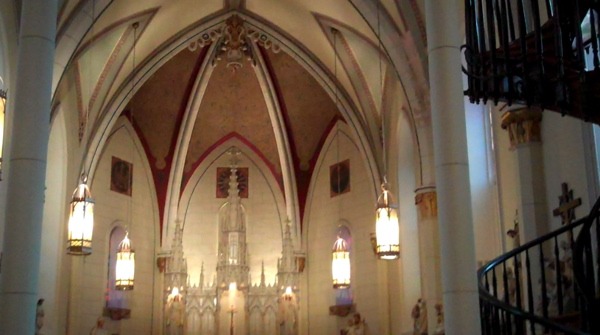By Trip Jennings
This commentary was originally posted on July 17 on ChurchRecovery.Blogspot.com, and is republished by permission of the author.
Is hope a four-letter word?
Weird question, right?
I’m a journalist, and we reporters see stuff that tends to eat away at one’s faith in humanity.
For me, that’s meant watching a governor go to federal prison for corruption; a 94-old woman dying of anthrax, a victim of a demented mind and a piece of mail; a 15-year-old killed in a drive-by shooting; a mayor doing 37 years behind bars for molesting two little girls in his office at City Hall.
Add to this regular scare-fest normal life: In my case, the loss of five family members from 2005 to 2010, three of them my age or slightly older.
Suddenly, at age 48, I am finding myself at war with the capriciousness – and fragility — of life. Each day I wake up wondering if this is the day hope gets got in my battle against cynicism and resignation. And some days I wonder if that would be such a great loss. Hope causes pain. It creates complications. Because you walk around vulnerable and open to the world and the world, if you haven’t noticed, is a basket case.
I’m not a lone warrior in my war, of course. I have powerful allies. My kids, for one, provide a tremendous sense of hope. My wife, my family of origin, and even episodes of Buffy the Vampire Slayer, lift my spirits.
If I’m honest with myself, even my chosen profession still inspires hope. I recently quit a newspaper gig to start an organization focused on in-depth journalism. My partner and I want to dig deep into issues such as health care, poverty, education and politics in the hopes of, you guessed it, improving our little corner of the world.
So here I am, a middle-aged seminary-educated, former Southern Baptist whose mother is a Presbyterian minister looking to Buffy the Vampire Slayer for hope rather than the church.
I’ve come a long way from that ash blond boy who used to read the Bible a lot, especially those parts about Jesus.
Or, for that fact, the 30-something newbie dad who 13 years ago wrapped up a three-year seminary stint spent reading theology, ethics and philosophy and engaged in wonderful challenging conversations with my professors and fellow seminarians.

So, again, I ask: Why am I relying on Joss Whedon and his stable of writers for a sense of hope, served up with a side order of wisdom, rather than the church?
Part of the answer lies with me. I’m lazy. I’d rather read the New York Times than shower and dress up for church each Sunday. And let’s face it. As a citizen of 21st- century United States, I am expertly trained in my rights as a consumer: I’m not buying anything unless I know I need it or it’s really compelling. I’m not so much an angry ex-churchgoer as an indifferent one.
Truth is, the institutional church seems irrelevant to me as I try to keep it together. What I recall most about church is all the stuff I had to believe. Jesus is my personal savior. Jesus rose from the dead. Jesus is the only Son of God.
Yes, I made good friends at church. But mostly I remember those statements of faith and the platitudes I heard over and over that never quite breathed life into the words people kept uttering.
How can the church help me if I half expect to hear the same platitudes again?
Learning that Jesus died for my sins and that I have a nice comfy seat on the magic bus headed straight to heaven once I die, all for the cheap price of my accepting Jesus Christ as my personal savior, does little to calm the bats fluttering around in my stomach most days.
What I’d like is to have someone who listens and understands what I’m going through. More than belief, I need to feel as if I’m not alone in this world where easy solutions shatter into a million pieces when they collide against complex problems.
Let me be clear: Some churches already do what I’m talking about. Too many of my friends are either pastors or go to church regularly, and I know them as genuine, compassionate people wrestling with matters of life and death and where faith fits in. But I don’t live near most of them. And I’m not sure I’m up to trying to figure out a new church these days. My life is exhausting enough already.
Sometimes, I imagine how a conversation at church might go if I engage with the wrong person.
Person: Doesn’t it provide a sense of comfort that you’ll live eternally? That Jesus died for you, personally?
Me: Really. You’re going to trot that one out. Making it all about the individual, all about me, is insidious. It rewards self-interest. Plus, man, it’s a slippery slope to apathy and complacency. You focus on you and your afterlife, and next thing you know you’re accepting the status quo in a messed-up world in need of a lot of help.
No thank you. Besides, words are easy. Saying Jesus is Lord and living like him are two very different things, bro.
Jesus knew this world was messed up, and it pissed him off. And it got him killed. Yeah, he died because of this broken piece of space dust. Frankly, I still don’t know what to make of Jesus after a lifetime of reading the Bible and three years in seminary.
But I tell you what. Jesus seemed plugged into something larger than himself, something larger than all of us. And he was prepared to die for that thing. That’s what I want. But don’t ask me to accept your name for that thing. Most of all don’t ask me to exclude others in the name of that thing.
I just want to find a community where I can seek that thing with other people who are on the same quest. Theological content, and statements of faith, are important. But for them to become meaningful I’ve got to translate them through the prism of my experience. And that takes honest conversation with others in which we collectively wrestle with real life, its pain, doubt, and its inequities. It also means that we can’t squeeze all the mystery out of this thing that is larger than us to try and paper over the fact that sometimes there aren’t answers to why this world is the way it is.
What we do have is each other. And this incomprehensible thing that is larger than us that I want to be a part of.
Trip Jennings is an award-winning journalist and Joss Whedon fan who also happens to have a Masters of Divinity from Columbia Theological Seminary in Decatur, Ga. He is also executive director of New Mexico In Depth, a fledgling media project with a focus on public interest journalism.


